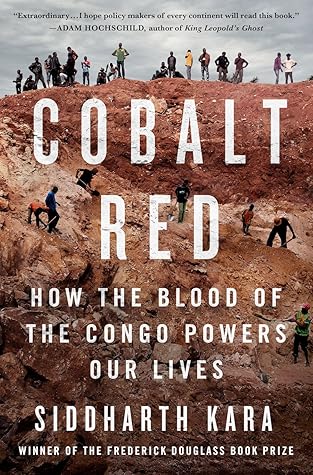More on this book
Community
Kindle Notes & Highlights
Read between
February 22 - March 26, 2025
The ongoing exploitation of the poorest people of the Congo by the rich and powerful invalidates the purported moral foundation of contemporary civilization and drags humanity back to a time when the people of Africa were valued only by their replacement cost. The implications of this moral reversion, which is itself a form of violence, stretch far beyond central Africa across the entire global south, where a vast subclass of humanity continues to eke out a subhuman existence in slave-like conditions at the bottom of the global economic order. Less has changed since colonial times than we
...more
In all my time in the Congo, I never saw or heard of any activities linked to either of these coalitions, let alone anything that resembled corporate commitments to international human rights standards, third-party audits, or zero-tolerance policies on forced and child labor. On the contrary, across twenty-one years of research into slavery and child labor, I have never seen more extreme predation for profit than I witnessed at the bottom of global cobalt supply chains.
Our daily lives are powered by a human and environmental catastrophe in the Congo.
At no point in their history have the Congolese people benefited in any meaningful way from the monetization of their country’s resources. Rather, they have often served as a slave labor force for the extraction of those resources at minimum cost and maximum suffering.
Apple, Samsung, Google, Microsoft, Dell, LTC, Huawei, Tesla, Ford, General Motors, BMW, and Daimler-Chrysler are just some of the companies that buy some, most, or all their cobalt from the DRC, by way of battery manufacturers and cobalt refiners based in China, Japan, South Korea, Finland, and Belgium. None of these companies claims to tolerate the hostile conditions under which cobalt is mined in the Congo, but neither they nor anyone else are undertaking sufficient efforts to ameliorate these conditions. In fact, no one seems to accept responsibility at all for the negative consequences of
...more
As of 2022, there is no such thing as a clean supply chain of cobalt from the Congo. All cobalt sourced from the DRC is tainted by various degrees of abuse, including slavery, child labor, forced labor, debt bondage, human trafficking, hazardous and toxic working conditions, pathetic wages, injury and death, and incalculable environmental harm.
Although the copious mineral riches of Katanga could easily fund numerous programs to improve child education, alleviate child mortality, upgrade sanitation and public health, and expand electrification for the Congolese people, most of the mineral wealth flows out of the country. Despite being home to trillions of dollars in untapped mineral deposits, the DRC’s entire national budget in 2021 was a scant $7.2 billion, similar to the state of Idaho, which has one-fiftieth the population. The DRC ranks 175 out of 189 on the United Nations Human Development Index. More than three-fourths of the
...more
Although Congolese law stipulates that mineral depots should be registered and operated only by Congolese nationals, almost all depots in Haut-Katanga and Lualaba Provinces are operated by Chinese buyers. Artisanal production accounts for up to 30 percent of all cobalt mined in the DRC, although the number could be even higher, as there is no accurate way to disaggregate artisanal from industrial production.


